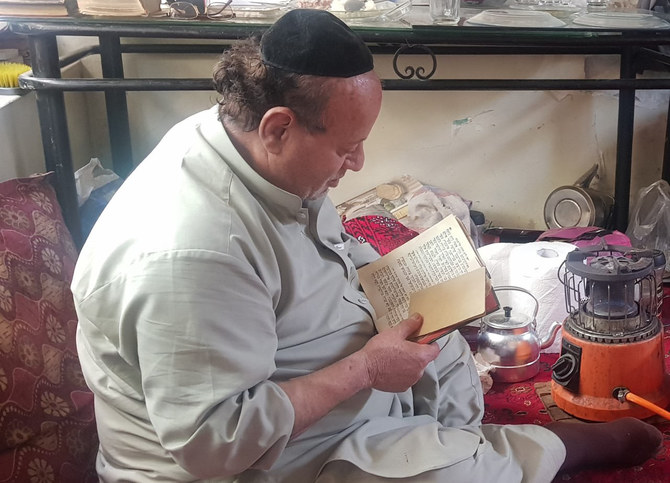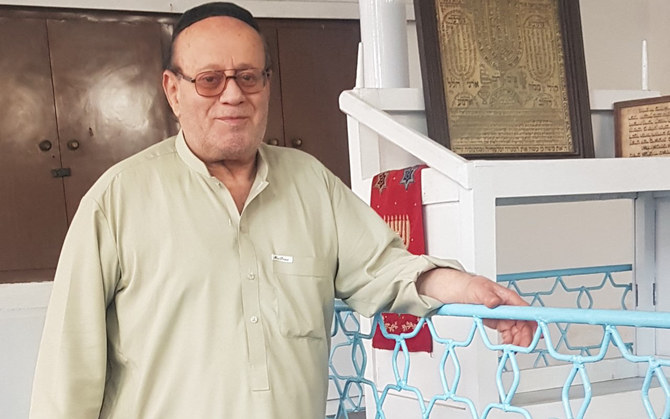KABUL: All his bags were packed, and Zabulon Simintov was ready to go.
But since the Taliban’s stunning takeover of Kabul last week, Simintov, Afghanistan’s last known Jew, has had a change of heart and plans, saying he does not wish to leave anymore.
It’s a stark contrast from his narrative a few months ago when Simintov, in his late 50s, told Arab News he “had had enough,” explaining how he was fearful of the Taliban’s return to power as the insurgents made rapid territorial gains and US-led foreign troops began withdrawing from Afghanistan in early May.
However, after the Taliban’s bloodless siege of the Afghan capital on Sunday and the group’s pledge to form an “all-inclusive government” and not “seek revenge against enemies,” Simintov says he has chosen to stay in Afghanistan, his home for over five decades.
“A few days ago, an Afghan came from America with a plane ticket to take me (back to Israel). I said I won’t go even if the plane comes outside my home,” he told Arab News over the phone from his home in Kabul on Saturday.
“I need to protect the synagogue here. I see no threat from the Taliban side. The Taliban have come; they are welcome! There is no fear, no threat,” Simintov, a carpet and jewelry merchant, added.
The Taliban have sought to present a more moderate face since last week’s lightning offensive, but the group was infamous for its harsh and repressive policies when it ruled Afghanistan from 1996 to 2001, before being toppled by US-led forces and prompting many to formulate an exit plan.
On Friday, NATO Secretary-General Jens Stoltenberg told a news conference that more than 18,000 people had been flown out of Afghanistan in the past few days.
But Simintov, who has served twice in the Afghan army, said he would not leave, despite his wife and two daughters moving to Israel in 1992.
As the caretaker of Kabul’s only synagogue, residing in its compound for decades, Simintov has witnessed a civil war, Soviet and US invasions of Afghanistan, the Taliban rule and the group’s return to power 20 years later.
The Kabul synagogue, established in 1966, is the only Jewish place of worship in the country after all Jews moved to Herat in western Afghanistan, which once hosted four synagogues.
Although information on the origins of Judaism in Afghanistan is scarce, it is believed that Jews came to the region about 2,000 years ago, living in relative peace and harmony in the Muslim-majority country until the mid 20th century.
Once a thriving community in Afghanistan, thousands of Afghan Jews left for Israel and Western countries in the late 1940s after the creation of Israel and after the Soviet invasion in 1979.
Others fled during the subsequent civil war under the Mujahideen and after the Taliban’s first ascension to power in 1996.
Simintov, who was born in Herat and later moved to Kabul, describes the country’s monarchical period, which ended in 1973, as the “golden era” for Jews but also for Afghans at large.
“I have no other demand from the Taliban; I want no position for myself. But like other people, want security.”
And, perhaps, his copy of the Torah back.
Simintov said Khairullah Khairkhaw, the former interior minister under the Taliban regime, “had confiscated the Torah from his custody in Kabul.”
Khairkhaw, who was released from the Guantanamo Bay prison in 2014 by former US president Barack Obama, serves as the Taliban’s political leader in Qatar, where the group has its political office.
“I will find the contact person for him and get the Torah back,” Simintov said.
The Taliban’s co-founder Mullah Abdul Ghani Baradar arrived in Kabul on Saturday for talks with senior group leaders and politicians on forming a new government.
The government council, which was formed to fill a void left by President Ashraf Ghani, who fled the country hours after the Taliban took over the presidential palace, includes former President Hamid Karzai, Gulbudin Hekmatyar, leader of the Hizb-e-Islami political and paramilitary group and Abdullah Abdullah, the old administration’s main peace envoy.
Simintov urged the Taliban “not to give any share to these former figures and militia leaders” who have been “behind the country’s destruction” and instead bring together “sound and professional individuals” from different ethnic groups and minorities.
“These leaders have given their test in the past, have plundered Afghanistan and looted billions ... Their presence will damage the Taliban’s credibility,” Simintov said.
Despite his hostility toward the Taliban in the past, he admits to Kabul and other areas “being safer under their rule,” blaming US leaders for “invading” Afghanistan and “creating destruction and carnage.”
“The US is leaving a bad name in history by invading here. The Taliban is back, why did it spend so much money, kill so many people and now leave this way? US citizens should not vote for (President Joe) Biden and (former President Donald Trump); both of them are totally mad,” he said.
“Let’s see what comes next.”































